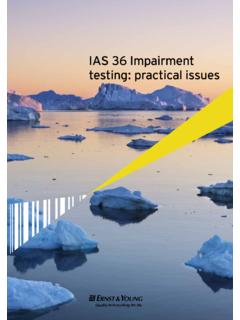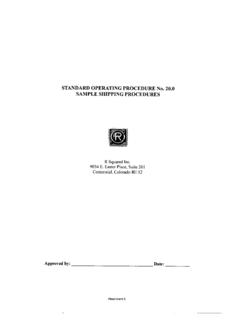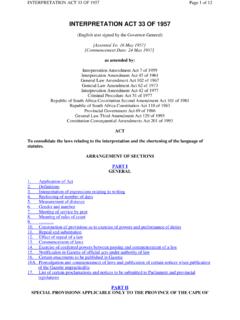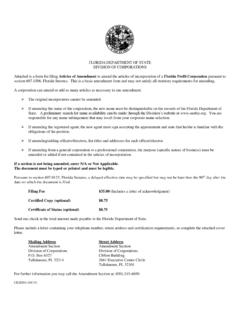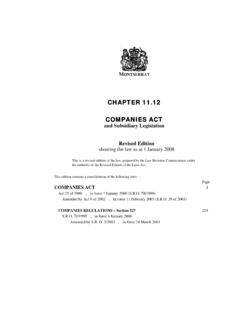Transcription of COLORADO REVISED STATUTES TITLE 24 …
1 COLORADO REVISED STATUTES TITLE 24 GOVERNMENT STATE : ADMINISTRATION ARTICLE 4 Rule-making and Licensing Procedures by State Agencies 24-4-101. Short article shall be known and may be cited as the "State Administrative Procedure Act". Legislative general assembly finds that an agency should not regulate or restrict the freedom of any person to conduct his or her affairs, use his or her property, or deal with others on mutually agreeable terms unless it finds, after a full consideration of the effects of the agency action, that the action would benefit the public interest and encourage the benefits of a free enterprise system for the citizens of this state. The general assembly also finds that many government programs may be adopted without stating the direct and indirect costs to consumers and businesses and without consideration of such costs in relation to the benefits to be derived from the programs.
2 The general assembly further recognizes that agency action taken without evaluation of its economic impact may have unintended effects, which may include barriers to competition, reduced economic efficiency, reduced consumer choice, increased producer and consumer costs, and restrictions on employment. The general assembly further finds that agency rules can negatively impact the state's business climate by impeding the ability of local businesses to compete with out-of-state businesses, by discouraging new or existing businesses from moving to this state, and by hindering economic competitiveness and job creation. Accordingly, it is the continuing responsibility of agencies to analyze the economic impact of agency actions and reevaluate the economic impact of continuing agency actions to determine whether the actions promote the public interest. 24-4-102.
3 Used in this article, unless the context otherwise requires: (1) "Action" includes the whole or any part of any agency rule, order, interlocutory order, license, sanction, relief, or the equivalent or denial thereof, or failure to act. Any agency rule, order, license, sanction, relief, or the equivalent or denial thereof which constitutes final agency action shall include a list of all parties to the agency proceeding and shall specify the date on which the action becomes effective. (2) "Adjudication" means the procedure used by an agency for the formulation, amendment, or repeal of an order and includes licensing. (3) "Agency" means any board, bureau, commission, department, institution, division, section, or officer of the state, except those in the legislative branch or judicial branch and except: (a) State educational institutions administered pursuant to TITLE 23 (except articles 8 and 9, parts 2 and 3 of article 21, and parts 2 to 4 of article 30), ; (b) The COLORADO law enforcement training academy created in part 3 of article of this TITLE ; and (c) The adjutant general of the national guard, whose powers and duties are set forth in section 28-3-106, ( ) "Aggrieved", for the purpose of judicial review of rule-making, means having suffered actual loss or injury or being exposed to potential loss or injury to legitimate interests including, but not limited to, business, economic, aesthetic, governmental, recreational, or conservational interests.
4 (4) "Counsel" means an attorney admitted to practice before the supreme court of this state. (5) "Decision" means the determinative action in adjudication and includes order, opinion, sanction, and relief. ( ) "Economic competitiveness" means the ability of the state of COLORADO to attract new business and the ability of the businesses currently operating in COLORADO to create new jobs and raise productivity. (6) "Initial decision" means a decision made by a hearing officer or administrative law judge which will become the action of the agency unless reviewed by the agency. ( ) "Interested person" includes any person who may be aggrieved by agency action. ( ) "Legislative committees of reference" means the committees established by the rules of the house of representatives and rules of the senate of the general assembly having jurisdiction over subject matter regulated by state agencies.
5 (7) "License" includes the whole or any part of any agency permit, certificate, registration, charter, membership, or statutory exemption. (8) "Licensing" includes the procedure used by an agency respecting the grant, renewal, denial, revocation, suspension, annulment, limitation, or modification of a license. (9) "Opinion" means the statement of reasons, findings of fact, and conclusions of law in explanation or support of an order. (10) "Order" means the whole or any part of the final disposition (whether affirmative, negative, injunctive, or declaratory in form) by any agency in any matter other than rule-making. (11) "Party" includes any person or agency named or admitted as a party, or properly seeking and entitled as of right to be admitted as a party, in any court or agency proceeding subject to the provisions of this article.
6 (12) "Person" includes an individual, limited liability company, partnership, corporation, association, county, and public or private organization of any character other than an agency. (13) "Proceeding" means any agency process for any rule or rule-making, order or adjudication, or license or licensing. (14) "Relief" includes the whole or any part of any agency grant of money, assistance, license, authority, exemption, exception, privilege, or remedy; recognition of any claim, right, immunity, privilege, exemption, exception, or remedy; or any other action upon the application or petition of, and beneficial to, any person. (15) "Rule" means the whole or any part of every agency statement of general applicability and future effect implementing, interpreting, or declaring law or policy or setting forth the procedure or practice requirements of any agency.
7 "Rule" includes "regulation". (16) "Rule-making" means agency process for the formulation, amendment, or repeal of a rule. (17) "Sanction" includes the whole or any part of any agency prohibition, requirement, limitation, or other condition affecting the freedom of any person; withholding of relief; imposition of any form of penalty or fine; destruction, taking, seizure, barring access to, or withholding of property; assessment of damages; reimbursement; restitution; compensation; costs; charges or fees; requirement; revocation or suspension of a license or the prescription or requirement of terms, conditions, or standards of conduct thereunder; or other compulsory or restrictive action. (18) "Small business" means a business with fewer than five hundred employees. 24-4-103. Rule-making - procedure - repeal.(1) When any agency is required or permitted by law to make rules, in order to establish procedures and to accord interested persons an opportunity to participate therein, the provisions of this section shall be applicable.
8 Except when notice or hearing is otherwise required by law, this section does not apply to interpretative rules or general statements of policy, which are not meant to be binding as rules, or rules of agency organization. ( ) If an agency reinterprets an existing rule in a manner that is substantially different than previous agency interpretations of the rule or if there has been a change in a statute that affects the interpretation or the legality of a rule, the office of legislative legal services shall review the rule in the same manner as rules that have been newly adopted or amended under paragraph (d) of subsection (8) of this section upon receiving a request for such a review of the rule by any member of the general assembly. (2) When rule-making is contemplated, public announcement thereof may be made at such time and in such manner as the agency determines, and opportunity may be afforded interested persons to submit views or otherwise participate informally in conferences on the proposals under consideration.
9 ( ) (a) At the time of filing a notice of proposed rule-making with the secretary of state as the secretary may require, an agency shall submit a draft of the proposed rule or the proposed amendment to an existing rule and a statement, in plain language, concerning the subject matter or purpose of the proposed rule or amendment to the office of the executive director in the department of regulatory agencies. The executive director, or his or her designee, may determine if the proposed rule or amendment may have a negative impact on economic competitiveness or on small business in COLORADO . If the executive director, or his or her designee, determines that the proposed rule or amendment may have such negative impact, he or she may direct the submitting agency to perform a cost-benefit analysis of the rule or amendment. If the executive director, or his or her designee, makes such a request, it shall be made at least twenty days before the date of the hearing on the rule or amendment.
10 The agency receiving such request shall complete a cost-benefit analysis at least five days before the hearing on the rule or amendment, shall make the analysis available to the public, and shall submit a copy to the executive director or his or her designee. Failure to complete a requested cost-benefit analysis pursuant to this subsection ( ) shall preclude the adoption of such rule or amendment. Such cost-benefit analysis shall include the following: (I) The reason for the rule or amendment; (II) The anticipated economic benefits of the rule or amendment, which shall include economic growth, the creation of new jobs, and increased economic competitiveness; (III) The anticipated costs of the rule or amendment, which shall include the direct costs to the government to administer the rule or amendment and the direct and indirect costs to business and other entities required to comply with the rule or amendment; (IV) Any adverse effects on the economy, consumers, private markets, small businesses, job creation, and economic competitiveness; and (V) At least two alternatives to the proposed rule or amendment that can be identified by the submitting agency or a member of the public, including the costs and benefits of pursuing each of the alternatives identified.
